#Cognitive Function Diet
Explore tagged Tumblr posts
Text
Nourishing Wellness: Exploring the Principles and Benefits of a Detoxifying Diet
Introduction: In a world inundated with processed foods, environmental toxins, and stressors, the concept of detoxifying diets has gained popularity as a means to cleanse the body, rejuvenate health, and restore vitality. While the term "detox" often conjures images of extreme juice cleanses or fasting regimens, the essence of a detoxifying diet lies in nourishing the body with nutrient-dense foods while minimizing exposure to toxins. In this article, we delve into the principles and benefits of a detoxifying diet, offering insights into how it can support overall well-being and promote optimal health.
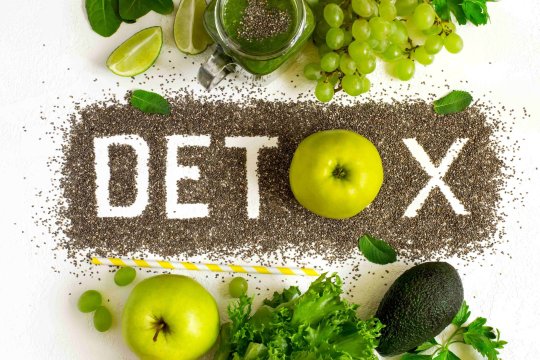
Understanding Detoxification: Detoxification is a natural process by which the body eliminates toxins and metabolic waste products through organs such as the liver, kidneys, lungs, skin, and digestive tract. These organs work synergistically to neutralize harmful substances and facilitate their excretion from the body. However, in modern times, the body's detoxification pathways can become overwhelmed due to factors such as poor dietary choices, environmental pollution, stress, and sedentary lifestyles. A detoxifying diet aims to support the body's innate detox mechanisms by providing essential nutrients, antioxidants, and phytochemicals while reducing the burden of toxins.
Principles of a Detoxifying Diet:
Emphasis on Whole, Plant-Based Foods:
A detoxifying diet prioritizes whole, unprocessed foods such as fruits, vegetables, legumes, whole grains, nuts, and seeds. These foods are rich in vitamins, minerals, fiber, and antioxidants, which support detoxification pathways and promote overall health.
Incorporating a variety of colorful plant foods ensures a diverse array of nutrients and phytochemicals, which have been shown to possess detoxifying properties and protect against chronic diseases.
Hydration with Water and Herbal Teas:
Adequate hydration is essential for optimal detoxification, as water supports the flushing out of toxins through urine and sweat.
Drinking plenty of water throughout the day helps maintain hydration levels and supports kidney function. Herbal teas such as green tea, dandelion tea, and ginger tea can also aid in detoxification by promoting digestion and liver health.
Minimization of Processed Foods and Toxins:
A detoxifying diet limits the consumption of processed foods, refined sugars, artificial additives, and unhealthy fats, which can contribute to toxin buildup in the body.
Choosing organic produce whenever possible helps reduce exposure to pesticides, herbicides, and other environmental toxins commonly found in conventionally grown crops.
Supportive Nutrients and Supplements:
Certain nutrients and supplements can enhance the body's detoxification processes. For example, foods rich in sulfur-containing compounds such as garlic, onions, and cruciferous vegetables support liver detoxification pathways.
Incorporating herbs and spices such as turmeric, cilantro, and milk thistle can also aid in detoxification and promote liver health.
Benefits of a Detoxifying Diet:
Enhanced Energy and Vitality:
By reducing the burden of toxins on the body and supporting optimal nutrient intake, a detoxifying diet can increase energy levels and promote overall vitality.
Many individuals report feeling lighter, more energized, and mentally clear after adopting a detoxifying diet, as the body's natural detoxification pathways are supported.
Improved Digestion and Gut Health:
Whole, plant-based foods are rich in fiber, which supports digestive health and promotes regular bowel movements.
By reducing intake of processed foods and potential allergens, a detoxifying diet can alleviate digestive discomfort and promote a healthy gut microbiome.
Enhanced Immune Function:
A well-nourished body is better equipped to defend against pathogens and foreign invaders. By providing essential nutrients and antioxidants, a detoxifying diet strengthens the immune system and supports overall immune function.
Phytonutrients found in plant foods have been shown to possess immune-boosting properties, helping the body fend off infections and maintain optimal health.
Weight Management and Hormonal Balance:
A detoxifying diet that emphasizes whole, nutrient-dense foods can support weight management goals by promoting satiety, reducing cravings, and stabilizing blood sugar levels.
By reducing exposure to endocrine-disrupting chemicals found in processed foods and environmental pollutants, a detoxifying diet can support hormonal balance and overall metabolic health.
Conclusion: In conclusion, a detoxifying diet offers a holistic approach to supporting the body's natural detoxification processes and promoting overall health and vitality. By prioritizing whole, plant-based foods, staying hydrated, minimizing exposure to toxins, and incorporating supportive nutrients, individuals can nourish their bodies and optimize their well-being. While there is no one-size-fits-all approach to detoxification, adopting a balanced and sustainable dietary pattern can yield numerous benefits for health and wellness. Let us embrace the principles of a detoxifying diet as a foundation for nourishing our bodies, supporting our health goals, and enhancing our quality of life.
Website: https://cruelty.farm/
https://sites.google.com/view/chronicdiseasereversal/home
https://seogoogle99.blogspot.com/2024/04/vegan-protein-sources.html
2 notes
·
View notes
Text
I know posts aren’t written with a universal audience in mind and that when people make posts like this they are probably not talking to me but
I HATE posts that are phrased to talk to everyone and say shit like “you NEED to be eating X”
shut up! you do not know a persons needs. just saw one that even went so far as to say they didn’t care if a person has a condition that makes it hard. shut up shut up! things that are healthy for most people are not necessarily good for everyone! like. my body does not tolerate cellulose. it makes me throw up. I can only tolerate vegetables in very specific circumstances, and I’m even then I will, not might, WILL, throw up part of the meal. I also receive premade meals in the mail as a disability accommodation. These meals are inevitably designed to cater to the Healthy Diet For Everyone. and as a result, I can’t eat like half of every single one because it’s steamed vegetables that will make me sick. nothing I can even do about it. it’s not possible to receive medical meals for MY medical needs. not to mention all the other stuff they send me that is prohibited for me (whole grain bread —I’m on a low fiber diet. milk —lactose intolerant. pineapple fruit/juice —allergic. tomatoes…allergic again.)
idk man it is an active problem in my life that everything presumes there is only one way to be healthy. I’m so sick of dealing with it. I DONT want to see it on tumblr too! leave nutrition advice to people’s doctors!!!
#rant#disability#actually disabled#actual diet advice from MY doctors that actually know me:#low fiber (GI specialist) high sodium (cardiologist and geneticist) drink lemonade instead of water (urologist)#reduce vegetable consumption (GI) drink high calorie beverages to supplement calorie intake (GI)#the only ‘normal’ advice was to avoid large amounts of fat#which I do because it makes me as sick as the vegetables#stop presuming you know what’s good for people!#I watch my bf do caretaker training videos to hired to care for me and the nutrition and meal planning section was all the same shit#I cannot express enough that if you try to make me live on high fiber and meals that are half steamed veggies with water to drink and#no salt#I will become malnourished#I will throw up so much that I lose weight and lose cognitive function#I will start collapsing whenever I stand up#and I will become so bloated that I only try to eat once a day#I know this because I’ve been there already due to stupid doctors that tried to shove me into a one size fits all diet#it was the most miserable time of my life#toward the end I was only able to stomach cups of tuna#i developed an aversion to eating in general bc I had linked the act of eating with being sick#I lost like 30 pounds in two months#sorry if I take the subject a little personal
3 notes
·
View notes
Text
Seeing ppl blame diet problems for untreatable illnesses pisses me off like
No Karen you can’t cure dementia with cholesterol. Stop feeding grandpa eggs
#sure diet can impact health such as low iron affecting cognitive function#but bitch essential oils can’t cure autism#what the fuck
0 notes
Text
The Ketogenic Diet Is Scientifically Endorsed Mainstream Solution for Mental Health
Here’s Why Another Landmark Study on the Ketogenic Diet Deserves Urgent Attention Imagine a world where nutrition — not drugs — could transform the lives of people battling debilitating neuropsychiatric disorders. Harvard-affiliated researchers offer precisely that promise, highlighting the ketogenic diet as a potential “transdiagnostic” treatment for a range of neuropsychiatric conditions,…
#Benefits of Ketosis#Dietary Interventions for Mental Health#β-Hydroxybutyrate and Brain Health#Keto and Neuropsychiatric Disorders#Keto Diet and Depression#Ketogenic Diet for Mental Health#Ketogenic Diet Research 2024#Ketosis and Cognitive Function#Natural Treatments for Mental Health#Science-Backed Keto Benefits
0 notes
Text
Rapid Learning Mastery: How to Absorb Information Quickly and Effectively
Unleash Your Brain's Full Potential

Are you tired of struggling to retain information or feeling overwhelmed by the sheer volume of knowledge available? "Rapid Learning Mastery" is your guide to mastering the art of efficient and effective learning. Discover proven techniques and strategies to absorb information rapidly and effortlessly.
Key Topics Explored:
• Active Learning: Engage with the material through hands-on activities, discussions, and problem-solving.
• Spaced Repetition: Reinforce learning by reviewing information at strategic intervals to maximize retention.
• Diverse Learning Resources: Explore various learning styles and formats, from books and articles to videos and podcasts.
• Prioritize Understanding over Memorization: Focus on comprehending concepts rather than simply rote memorization.
• Optimize Your Learning Environment: Create a conducive space for focused study and minimize distractions.
• The Sponge Effect: Learn how to become a sponge for knowledge and absorb information effortlessly.
• The Role of Healthy Lifestyle: Discover the connection between physical health and cognitive performance.
• Foods that Enhance Brain Power and Memory: Explore nutrition strategies to fuel your brain for optimal learning.
With "Rapid Learning Mastery", you'll learn:
• How to create a personalized learning plan
• Effective memory techniques and strategies
• Tips for overcoming learning challenges
• Strategies for staying motivated and focused
Whether you're a student, professional, or lifelong learner, "Rapid Learning Mastery" will empower you to unlock your full potential and achieve your learning goals.
#Rapid learning techniques#Master fast learning#Effective information absorption#Quick learning strategies#Boost memory retention#Active learning methods#Spaced repetition benefits#Learning environment optimization#Brain power foods#Enhance cognitive function#Accelerate learning process#Study techniques for fast learning#Improve memory recall#Learning efficiency tips#Cognitive enhancement through diet#books#science#nature#health and wellness#skill#career
0 notes
Text
The Impact of Sugar on Mental Health and Mood
In a world where convenience often dictates our dietary choices, sugar has become an almost unavoidable part of daily life. From sweetened beverages to processed foods, sugar is deeply embedded in modern diets. While the physical consequences of excessive sugar intake—such as obesity, diabetes, and heart disease—are widely recognized, the mental health implications are less frequently discussed.…
#anxiety and sugar#cognitive function#gut-brain connection#mental health diet#sugar addiction#sugar and depression#sugar and mood
0 notes
Text
5 Harmful Foods for Memory That You Should Avoid Today
Harmful foods for memory can silently sabotage your cognitive abilities, leading to forgetfulness and even long-term memory issues. In this article, we’ll uncover the five worst foods for your memory and provide healthier alternatives to help you maintain a sharp and healthy brain. Whether you’re looking to improve your diet or just curious about the connection between food and memory, this…
#alcohol impact#brain health#cognitive function#diet tips#harmful foods#memory health#processed foods#sugar effects#trans fats
1 note
·
View note
Text
Matcha for Weight Loss: Does It Boost Metabolism & Aid Fat Burning?
Sipping on emerald green goodness, feeling zen, and shedding pounds – sounds like a dream, right? Well, matcha tea, the powdered powerhouse from Japan, might just be the key to unlocking this dream (or at least a part of it!). But before you start chugging gallons of the stuff, let’s spill the tea on whether matcha can actually help with weight loss. First things first: Matcha is NOT a magic…

View On WordPress
#Antioxidants#ceremonial-grade#cognitive function#diet#EGCG#energy boost#fat burning#green tea#Health#healthmonastery#healthy lifestyle#L-theanine#matcha tea#metabolism#organic#relaxation#smoothie#Weight Loss
0 notes
Text
Exploring the Myriad Health Benefits of a Vegan Lifestyle
In recent years, the vegan health benefits lifestyle has gained significant traction, propelled not only by ethical and environmental concerns but also by a growing recognition of its health benefits. Choosing a vegan diet means abstaining from all animal products, including meat, dairy, eggs, and even honey, and instead, focusing on plant-based foods. This shift in dietary habits can lead to a multitude of health advantages, ranging from reduced risk of chronic diseases to improved overall well-being. Let's delve deeper into the myriad health benefits that accompany a vegan lifestyle.
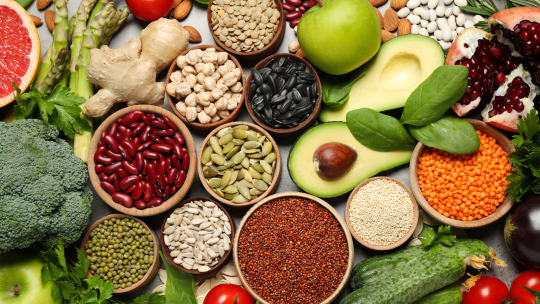
Enhanced Nutrient Intake
One of the primary misconceptions about veganism is that it leads to nutrient deficiencies. However, when appropriately planned, a vegan health benefits diet can provide all the essential nutrients the body needs for optimal functioning. Plant-based foods are rich sources of vitamins, minerals, antioxidants, and fiber. By incorporating a variety of fruits, vegetables, whole grains, legumes, nuts, and seeds into their diet, vegans can ensure they meet their nutritional requirements without the need for animal-derived products.
Lower Risk of Chronic Diseases
Numerous studies have shown that adopting a vegan lifestyle can significantly reduce the risk of developing chronic diseases such as heart disease, hypertension, type 2 diabetes, and certain types of cancer. The absence of cholesterol and the lower intake of saturated fats in a vegan diet contribute to improved cardiovascular health. Additionally, the high fiber content of plant-based foods helps regulate blood sugar levels and promotes digestive health, thereby reducing the risk of diabetes and gastrointestinal disorders.
Healthy Weight Management
Obesity has become a global epidemic, leading to various health complications. a vegan health benefits diet, characterized by its low-calorie density and high fiber content, can be an effective tool for weight management. Plant-based foods tend to be more filling than their animal-based counterparts, leading to reduced calorie intake and increased satiety. Moreover, studies have shown that vegans tend to have lower body mass indexes (BMIs) and lower rates of obesity compared to non-vegans.
Improved Digestive Health
Fiber is essential for maintaining a healthy digestive system, promoting regular bowel movements, and preventing constipation. Since plant-based foods are naturally rich in fiber, individuals following a vegan diet often experience improved digestive health. Furthermore, the consumption of fruits, vegetables, and whole grains provides a diverse array of beneficial nutrients that support gut microbiota, fostering a balanced and resilient microbial community in the intestines.
Enhanced Athletic Performance
Contrary to the misconception that vegans lack sufficient protein for muscle growth and athletic performance, many athletes have successfully adopted a vegan diet and achieved remarkable results. Plant-based sources of protein, such as legumes, tofu, tempeh, seitan, and quinoa, provide ample amino acids necessary for muscle repair and recovery. Additionally, the anti-inflammatory properties of plant-based foods can help reduce exercise-induced inflammation and promote faster recovery.
Improved Skin Health
The old adage "you are what you eat" holds true when it comes to skin health. A diet rich in fruits, vegetables, nuts, and seeds provides essential vitamins, minerals, and antioxidants that nourish the skin from within. The abundance of vitamins A, C, and E found in plant-based foods helps protect against oxidative damage, promote collagen production, and maintain youthful skin. Furthermore, the anti-inflammatory properties of a vegan diet can alleviate skin conditions such as acne, eczema, and psoriasis.
Environmental Sustainability
In addition to personal health benefits, adopting a vegan health benefits lifestyle can have a positive impact on the environment. Animal agriculture is a leading contributor to greenhouse gas emissions, deforestation, water pollution, and habitat destruction. By choosing plant-based foods over animal products, individuals can reduce their carbon footprint, conserve water resources, and help mitigate climate change. Embracing sustainable eating habits not only benefits current generations but also preserves the planet for future generations to come.
Conclusion
The health benefits of a vegan health benefits lifestyle extend far beyond personal well-being, encompassing environmental sustainability and ethical considerations. By embracing plant-based foods and eliminating animal products from their diets, individuals can experience enhanced nutrient intake, lower risk of chronic diseases, healthy weight management, improved digestive health, enhanced athletic performance, and radiant skin. Furthermore, the transition to a vegan lifestyle aligns with principles of compassion, sustainability, and global responsibility. As awareness continues to grow, more people are recognizing the profound impact of their dietary choices on their health, the planet, and all living beings.
Website: https://cruelty.farm/
#vegan health benefits#Positive Change Veganism#Cognitive Function Diet#Weight Management Vegan#Detoxifying Diet#Anti-Inflammatory Vegan#Vegan Gut Health#Vegan Athletes#Vegan Longevity#Chronic Disease Reversal#Vegan Protein Sources#Muscle Building Vegan#Vegan Iron Sources#Calcium in Vegan Diet
3 notes
·
View notes
Text
Muscle Strength: Building a Powerful and Functional Body
Muscle Strength: Building a Powerful and Functional Body
Muscle strength is often associated with athleticism or a sculpted physique, but its benefits extend far beyond aesthetics. Strong muscles play a vital role in our overall health and well-being, impacting everything from daily activities to chronic disease prevention. Benefits of Muscle Strength: Improved physical performance: Strong muscles enhance athletic abilities, increase endurance, and…

View On WordPress
#balance and stability#body composition#bones and joints#cognitive function#compound exercises#fun exercise#Healthy Diet#healthy lifestyle#hydration#independence#listen to your body#metabolism#mindful mornings#mood#morning mantra#morningmantra#muscle strength#optimal health#overall health#physical performance#proper form#quality of life#resistance training#rest and recovery#warm up and cool down#well-being
0 notes
Text
New Way to Keep Your Brain Sharp? This Diet the Key to a Lifetime of Cognitive Function

Imagine a world where you can keep your mind sharp and your memory strong for a lifetime, even as you age. Well, it may be possible, thanks to the DASH diet.
The DASH diet is a healthy eating plan that emphasizes whole grains, fruits, vegetables, and lean proteins, and recommends reducing intake of saturated fats and sodium. The diet was originally developed to help lower blood pressure, but it has since been shown to have other health benefits, including reducing the risk of heart disease, stroke, and type 2 diabetes.
How does the DASH diet protect cognitive health?
The DASH diet may protect cognitive health in a number of ways. First, it helps to reduce the risk of cardiovascular disease, which is a major risk factor for cognitive decline. Cardiovascular disease can damage the brain and lead to cognitive decline over time.
Second, the DASH diet provides the brain with essential nutrients, such as antioxidants and omega-3 fatty acids, which are important for maintaining cognitive function. Antioxidants help to protect the brain from damage, while omega-3 fatty acids are essential for brain development and function.
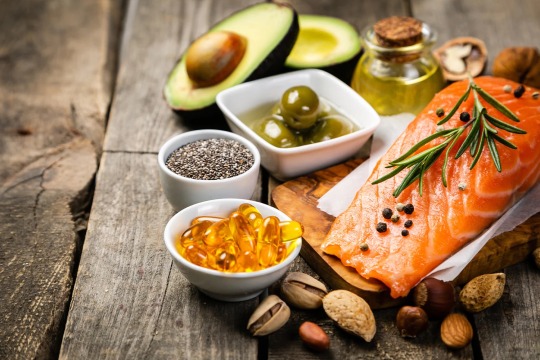
New research on the DASH diet and cognitive health
A new study published in the Journal of the American Heart Association found that women who followed a heart-healthy diet in midlife were less likely to report cognitive decline decades later. The study followed over 1,500 women for over 30 years and found that those who adhered most closely to the DASH diet were 17% less likely to report cognitive decline than those who adhered least to the diet.
The study's authors believe that the DASH diet may protect cognitive health by reducing the risk of cardiovascular disease and providing the brain with essential nutrients. They also note that the DASH diet is a sustainable diet that can be followed for a lifetime, which is important for maintaining cognitive health over the long term.
How to follow the DASH diet
If you're interested in following the DASH diet, there are a few things you can do:
Eat plenty of fruits and vegetables. Aim for at least 4.5 cups of fruits and vegetables per day. Fruits and vegetables are packed with essential nutrients, including antioxidants and vitamins, which are important for cognitive health.
Choose whole grains over refined grains. Whole grains are a good source of fiber and other nutrients that are important for cognitive health. Refined grains, on the other hand, have been stripped of many of their nutrients.
Choose lean protein sources, such as fish, chicken, and beans. Lean protein sources are low in saturated fat and calories, and they are a good source of protein, which is essential for brain function.
Limit saturated and unhealthy fats. Saturated and unhealthy fats can increase your risk of cardiovascular disease,which is a risk factor for cognitive decline.
Reduce your sodium intake. Aim for no more than 2,300 milligrams of sodium per day. Too much sodium can increase your blood pressure, which is a risk factor for cardiovascular disease and cognitive decline.
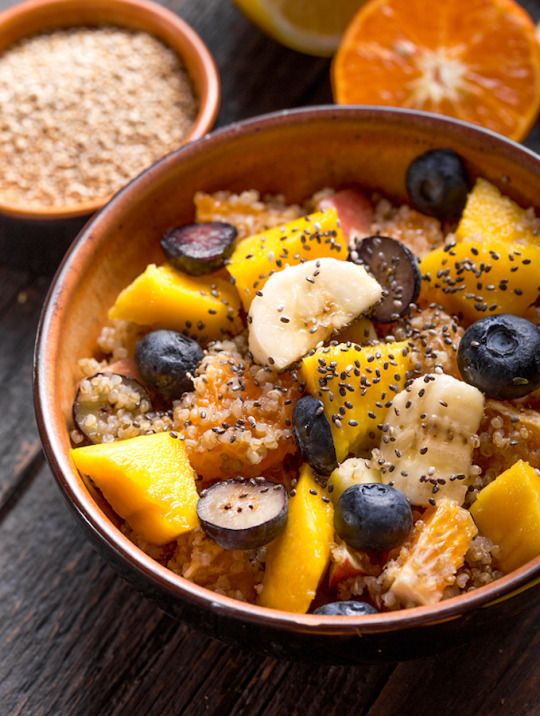
Here is a sample DASH diet meal plan for one day:
Breakfast:
Oatmeal with berries and nuts
Yogurt with fruit and granola
Whole-wheat toast with avocado and eggs
Lunch:
Salad with grilled chicken or fish
Lentil soup
Turkey sandwich on whole-wheat bread with vegetables
Dinner:
Salmon with roasted vegetables
Chicken stir-fry with brown rice
Lentil and vegetable stew
Snacks:
Fruits and vegetables
Nuts and seeds
Yogurt
Conclusion
Following a heart-healthy diet in midlife is one of the best things you can do to protect your cognitive health in later life.The DASH diet is a good option for women of all ages, but it may be especially beneficial for women in midlife who are at increased risk for cognitive decline.
Additional tips for protecting your cognitive health
In addition to following a heart-healthy diet, there are a few other things you can do to protect your cognitive health:
Get regular exercise. Exercise is important for overall health and well-being, including cognitive health. Aim for at least 30 minutes of moderate-intensity exercise most days of the week.
Stay mentally active. Engaging in mentally stimulating activities, such as reading, puzzles, and learning new things, can help to keep your mind sharp.
Get enough sleep. Sleep is essential for cognitive function. Aim for 7-8 hours of sleep per night.
Manage stress. Stress can damage the brain and increase your risk of cognitive decline. Find healthy ways to manage stress,
**Disclosure:** Please note that this article may contain affiliate links. As part of the Amazon Associates Program, I earn small commissions from qualifying purchases through these links. However, these links do not influence my product recommendations. I only recommend products and services that I genuinely believe in and that I think will be helpful to my readers.
Additionally, the information in this article is not intended to be a substitute for professional medical advice. Please consult with your doctor before making any changes to your health.
Thank you for your understanding.
#health#healthy#dash diet#women health#brain health#cognitive decline#mental health#mental illness#cardiovascular#cardiovascular disease#cognitive health#brain function#new research#stress management#manage stress#exercise#exercices#sleep
0 notes
Text
Internal Glow up Part Two- Brain Health


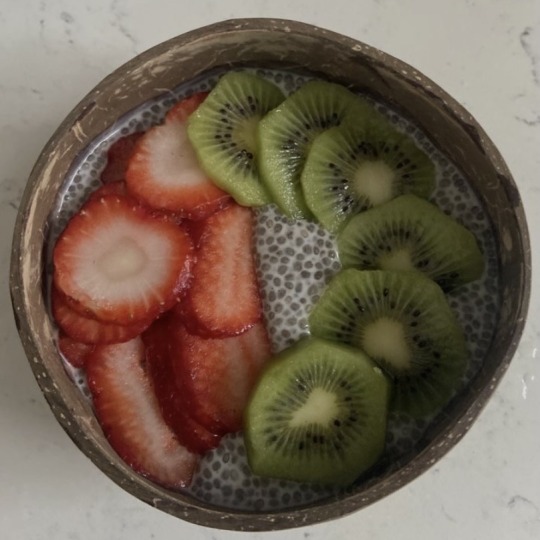

Diet
Eating lots of omega fatty acids can help with brain function and concentration. You can get these in a supplement form or from foods like salmon, tuna, walnuts, chia seeds and flax seeds.
Foods high in vitamin k like dark leafy greens such as spinach, kale, broccoli and collard has been shown to slow cognitive decline
The pigments in berries can help improve memory
Hydration is super importation for function and to prevent headaches
Concentration
Use meditation apps to improve focus and mood- Calm, Insight timer and Medito
Improve sleep quality
Avoid multitasking
Take regular breaks
Physical activity will release endorphins and create a positive mindset
Train your brain
Play games like sudoku, crosswords, puzzles and chess to improve memory and concentration
Complete creative tasks like colouring, painting and building. This could be creating decorations or completing a colouring book as relaxation
Spend time in nature
Not only is it relaxing and can be a good form of exercise but there are other benefits
Studies and reviews have found that it can improve attention and response time
This can be sitting in your garden, walking around a lake, or having a few snacks while sitting in a field

Series Masterlist
#becoming that girl#girl blogger#girl blogging#clean girl#fitness#it girl#it girls#pink pilates princess#ldr#self improvement#vanilla girl#fit girls#healthy#study aesthetic#studyblr#that girl#becoming her#hell is a teenage girl#pink pilates girl#matcha#cherry girl#gossip girl#girlhood#lizzy grant#my goals#hot girls read#health and wellness#healing#self care
1K notes
·
View notes
Text
How to Keep Your Brain Healthy as You Age
Aging is an inevitable part of life, and as we grow older, our bodies, including our brains, undergo significant changes. Cognitive decline is often viewed as an inevitable aspect of aging, but research shows that lifestyle choices, mental habits, and health practices can significantly influence how our brains age. By adopting proactive measures, it’s possible to maintain cognitive function,…
0 notes
Text
Impact of Sleep on Mental Health Key Findings!
Sleep and mental health are closely interconnected. Poor sleep can have a significant impact on psychological well-being, exacerbating existing mental health issues and potentially leading to new problems. Here are some key findings regarding the impact of sleep on mental health. Unlocking the Secrets to Better Mental Health: Meta-analysis of Randomized Controlled Trials Reveals the Power of…

View On WordPress
#bedtime routine#CBT-I#Cognitive function#Diet#impact#key findings#Mental health#Mindfulness#mood regulation#Physical activity#professional help#Psychiatric disorders#psychological resilience#Relaxation Techniques#screen time#Sleep#Sleep deprivation#sleep environment#Sleep hygiene#sleep schedule#Stress#Stress Management
0 notes
Text
self care is . . .



Reading a book: Engaging with literature to relax, learn, and escape from daily stress.
Meditation: Practicing mindfulness to calm the mind and reduce stress.
Eating a balanced diet: Consuming a variety of nutrients to maintain overall health.
Exercising regularly: Keeping the body active to improve physical and mental health.
Getting enough sleep: Ensuring sufficient rest to allow the body to recover and function optimally.
Listening to music: Enjoying music to boost mood and reduce anxiety.
Stress management: Implementing techniques to control and reduce stress levels.
Setting boundaries: Establishing limits to protect personal time and energy.
Being creative: Engaging in creative activities to express oneself and relax.
Time management: Organizing time effectively to balance responsibilities and leisure.
Taking regular breaks: Resting periodically to maintain productivity and prevent burnout.
Stretching: Keeping the body flexible and reducing muscle tension.
Practicing gratitude: Focusing on positive aspects of life to boost happiness.
Looking after your skin: Maintaining skincare routines to promote skin health.
Effective communication: Clearly expressing thoughts and feelings to foster healthy relationships.
Saying no: Declining unnecessary obligations to prioritize personal well-being.
Challenging your mind: Engaging in activities that stimulate cognitive growth and learning.
Learning new things: Continuously seeking knowledge to enhance personal development.
Regular medical checkups: Attending routine health screenings to prevent and detect illnesses early.
Hanging out with friends: Socializing to build strong support networks and enjoy companionship.
Spending time with family: Connecting with loved ones to strengthen family bonds.
Me time: Dedicating time solely to oneself for relaxation and self-reflection.
Self-reflection: Evaluating personal thoughts, actions, and experiences to gain insight.
Asking for help: Seeking support when needed to manage challenges effectively.
Setting goals: Defining personal objectives to provide direction and motivation.
Developing healthy habits: Establishing routines that promote long-term well-being.
Using your voice: Speaking up for oneself to ensure needs and desires are met.
© bloomzone
#becoming that girl#glow up#wonyoungism#wonyoung#dream life#it girl#creator of my reality#divine feminine#it girl affirmations#love affirmations#𝜗𝜚 ── ⊹ ‧#self confidence#self love#self growth#self improvement#self care#get motivated#mindset
1K notes
·
View notes
Text
10 Surprising Health Benefits of Eating Dark Chocolate
Introduction: Dark chocolate is not only a tasty treat, but it also has a variety of health benefits that may surprise you. From improving heart health to boosting brain function, there are many reasons to indulge in a bit of dark chocolate every day. In this article, we’ll explore the top 10 health benefits of dark chocolate, backed by scientific research and expert opinions. Top 10 Benefits of…

View On WordPress
#added sugars#antioxidant status#antioxidants#blood pressure#brain function#cocoa#cognitive functions#coronary vasomotion#dark chocolate#dietary intake#endothelium-dependent vasodilation#Exercise#flavanols#health benefits#healthy diet#healthy treat#heart health#high-quality brands#hypertension#insulin resistance#lipid metabolism#lipid profile#minimal processing#moderate intensity cycling#organic cocoa beans#platelet reactivity#scientific research#type 2 diabetes#visual functions#weight loss
0 notes